
Józef Mackiewicz was a Polish writer, novelist and political commentator; best known for his documentary novels Nie trzeba głośno mówić, and Droga donikąd. He staunchly opposed communism, referring to himself as an "anticommunist by nationality". Mackiewicz died in exile. His older brother Stanisław Mackiewicz was also a writer.

Lychakiv Cemetery, officially State History and Culture Museum-Preserve "Lychakiv Cemetery", is a historic cemetery in Lviv, Ukraine.

Wanda Wasilewska, also known by her Russian name Vanda Lvovna Vasilevskaya, was a Polish and Soviet novelist and journalist and a left-wing political activist. She was a socialist who became also a devoted communist. She fled the German attack on Warsaw in September 1939 and took up residence in Soviet-occupied Lviv and eventually in the Soviet Union. She was the founder of the Union of Polish Patriots there and played an important role in the creation of the 1st Tadeusz Kościuszko Infantry Division. The division developed into the Polish People's Army and fought on the Eastern Front during World War II. Wasilewska was a trusted consultant to Joseph Stalin and her influence was essential to the establishment of the Polish Committee of National Liberation in July 1944 and to the formation of the Polish People's Republic.
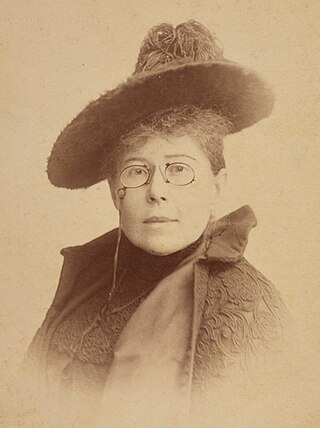
Maria Konopnicka was a Polish poet, novelist, children's writer, translator, journalist, critic, and activist for women's rights and for Polish independence. She used pseudonyms, including Jan Sawa. She was one of the most important poets of Poland's Positivist period.

Stanisław Jerzy Lec, born Baron Stanisław Jerzy de Tusch-Letz, was a Polish aphorist and poet. Often mentioned among the greatest writers of post-war Poland, he was one of the most influential aphorists of the 20th century, known for lyric poetry and skeptical philosophical-moral aphorisms, often with a political subtext.

Zbigniew Herbert was a Polish poet, essayist, drama writer and moralist. He is one of the best known and the most translated post-war Polish writers. While he was first published in the 1950s, soon after he voluntarily ceased submitting most of his works to official Polish government publications. He resumed publication in the 1980s, initially in the underground press. Since the 1960s, he was nominated several times for the Nobel Prize in Literature. His books have been translated into 38 languages.

Zygmunt Szendzielarz was the commander of the Polish 5th Wilno Brigade of the Home Army, nom de guerre "Łupaszka". He fought against the Red Army after the end of the Second World War. Following the Soviet takeover of Poland at the end of World War II he was arrested, accused of numerous crimes and executed in the Mokotów Prison as one of the anti-communist cursed soldiers. After the fall of communism, in 1993, Szendzielarz was rehabilitated and declared innocent of all charges. In 2007 Polish president Lech Kaczyński posthumously awarded Szendzielarz with the order of Polonia Restituta. His involvement in the Dubingiai massacre of 1944, however, remains controversial.

General Michał Tadeusz Tokarzewski-Karaszewicz, Coat of arms of Trąby pseudonym Doktor, Stolarski, Torwid was a Polish general, founder of the resistance movement "Polish Victory Service".
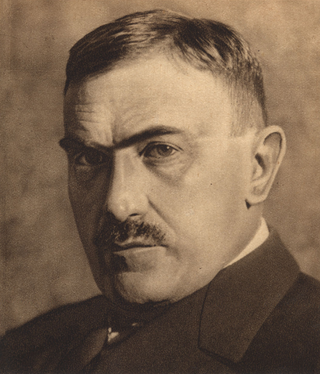
Tadeusz Kamil Marcjan Żeleński was a Polish stage writer, poet, critic and, above all, the translator of over 100 French literary classics into Polish. He was a pediatrician and gynecologist by profession.
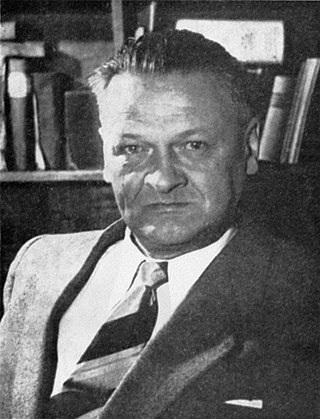
Władysław Kazimierz Broniewski was a Polish poet, writer, translator and soldier. Known for his revolutionary and patriotic writings.

Władysław Gizbert-Studnicki was a Polish politician and publicist. Throughout his life, Studnicki was famous for his strongly pro-German stance, and in the Polish People's Republic all his books were banned from publication. He was the older brother of historian Wacław Studnicki.

Anna Borkowska was a Polish war refugee who settled in Iran. She was an actress and vocal teacher. As a child, after the Soviet invasion of Poland she was forced to leave home with some of her family members and transported to a forced labor camp in Siberia in the Soviet Union. She was one of the 120,000 Polish refugees who fled the Soviet Union with Anders' Army after the Axis invasion in 1941. She settled in Tehran.

Halina Górska was a Polish writer and a communist activist.

Karol Kuryluk was a Polish journalist, editor, activist, politician and diplomat. In 2002, he was honored by Yad Vashem for saving Jews in the Holocaust.
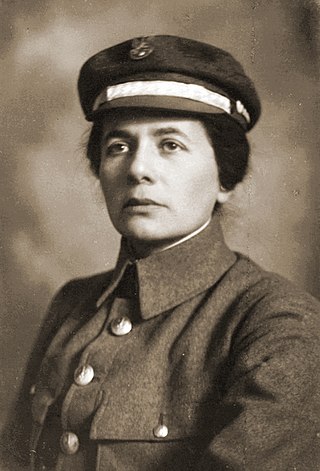
Lt. Col. Aleksandra Zagórska, firstly, Bitschan, secondly, Zagórska, aka Aleksandra Bednarz – was a lieutenant colonel in the Polish Armed Forces, a soldier in the Legions, organizer and commandant of the Ochotnicza Legia Kobiet and an independence activist.

Maria (Mia) Kuryluk was a poet, writer, translator, and amateur pianist. She was first married to Teddy Gleich (1912–1946), then to Karol Kuryluk (1910–1967). She was the mother of Ewa Kuryluk and Piotr Kuryluk (1950–2004).

Ferdynand Goetel was a Polish novelist, playwright, essayist, screen writer, and political activist; member of the prestigious Polish Academy of Literature from 1935; president of the Polish PEN Club as well as the Union of Polish Writers in interwar Poland. He established a prominent place in Polish literary circles between the wars and was the recipient of the "Golden Laurel" awarded by the Polish Academy of Literature for his contributions to Polish literature. He was forced to leave Poland after World War II due to his involvement in the German investigation of the Katyn massacre and died in exile in London.

Józef Weyssenhoff was a Polish novelist, poet, literary critic, publisher. Close to the National Democracy political movement after 1905, he paid tribute to the tradition of the Polish landed gentry in the Eastern Borderlands. He lived several years in Bydgoszcz in the 1920s.
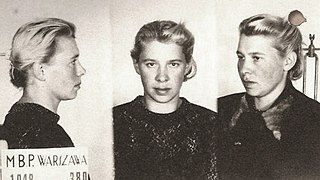
Lidia Lwow-Eberle nom de guerre "Ewa" was a Russian born Polish nationalist and paramedic. She was arrested by the communist authorities and she was imprisoned "for life". She later married and became an archaeologist.

Gustawa Jarecka was a Polish novelist. She was a daughter of Moszek Jarecki and Natalia Jarecka.




















